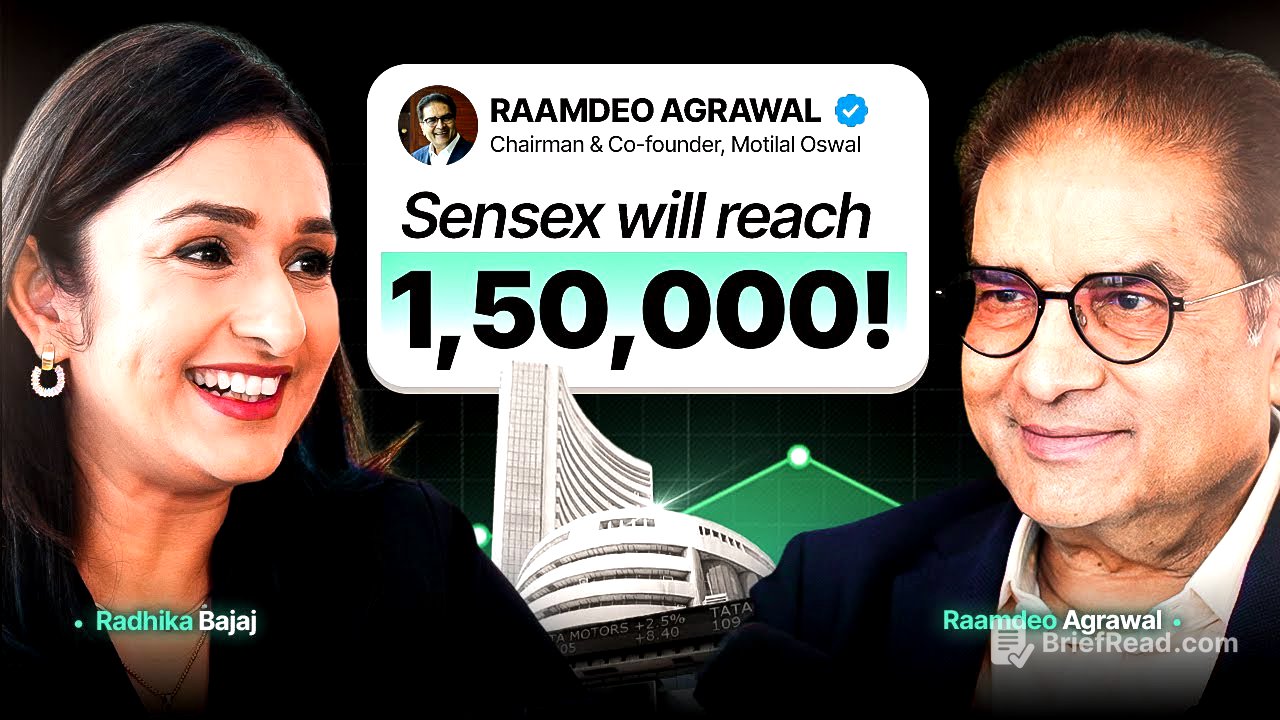TLDR;
Ramdeo Agrawal, co-founder of Motilal Oswal, shares his insights on long-term investing, navigating market cycles, and the importance of value investing. He emphasizes patience, understanding business models, and the significance of a strong value system. Agrawal also touches on the impact of AI, the predictability of the Indian market, and his personal investment philosophy.
- Patience and long-term vision are crucial for successful investing.
- Understanding the underlying value of a company is more important than timing the market.
- A strong value system and being a good human being are essential for overall success.
Highlights [0:00]
The highlights of the discussion include the importance of not missing the initial market reversal, as the first 30-40% gain can happen quickly. India and the US are highlighted as the only two markets where economic development reliably translates into stock market performance. Key financial ratios, especially return on equity (ROE) and terms of trade, are crucial for evaluating a company's solidity. It's noted that during market crises, price discovery is common, but understanding value is key. Asymmetric returns, where the potential upside significantly outweighs the downside, are what investors should seek.
Long-Term Vision & Patience [2:10]
Ramdeo Agrawal discusses his long-term vision for the Indian stock market, setting a target of three lakhs for the BSC Sensex with a CAGR of 14%. He explains that market movements are not linear, and averaging out the returns over a longer period provides a more accurate picture. Agrawal emphasizes that India is a predictable market compared to the US, with a high probability of significant per capita income growth in the coming years. Geopolitical issues are ever-present but should not deter long-term investment strategies.
Navigating Bubbles & Smart Exits [8:43]
Agrawal reflects on past market cycles, including the Y2K boom and the 2003-2007 bull run, noting the excesses and eventual collapses. He admits to not timing the market perfectly but emphasizes the importance of staying invested despite potential corrections. Agrawal believes that attempting to time the market and capture both the top and bottom is futile.
Insights from Infosys & Learning from Mistakes [11:20]
Agrawal recounts his experience with Infosys during the Y2K boom, where a small allocation grew significantly. He also shares a cautionary tale of reinvesting profits from a successful exit into a failing company, highlighting the importance of sitting on cash and waiting for the right opportunity. Agrawal advises selling when money has doubled eight to ten times, emphasizing the need for control over greed. He also stresses the importance of patience and waiting under the right tree, meaning investing in fundamentally sound companies.
Information Abundance, Patience Scarcity [18:00]
Agrawal notes that while data accessibility has improved, patience is declining in the market. The focus has shifted towards trading rather than investing, with a shorter average holding period. He advocates for a balance between trading and value investing, emphasizing the need to teach value investing in academic settings. Agrawal believes that instinct still plays a crucial role in stock picking, particularly in determining how much to allocate.
AI & Future Business Models [26:47]
Agrawal discusses the potential impact of AI on business models, questioning whether it will create new companies or enhance existing ones. He shares his experience using AI for wealth creation studies, noting its ability to quickly summarize and analyze large amounts of information. Agrawal emphasizes the importance of being well-informed when meeting with management and customers, using AI to stay on top of company announcements.
Power of the leading person & Public Markets [29:32]
Agrawal asserts that public markets offer the best opportunities for finding value, as companies in trouble are often undervalued. He contrasts this with private markets, where deals tend to be bullish and occur when companies are already doing well. Agrawal highlights the potential for significant gains in listed markets when identifying and investing in broken blue chips. He also emphasizes that at early stage of the company leading person is more important than business itself.
Worst Days in career [35:34]
Agrawal recalls the Harshad Mehta scam as one of the worst days in his career, with a significant drawdown in his portfolio. He emphasizes the importance of not being leveraged and maintaining financial stability. Agrawal also mentions the shock of the lockdown announcement during the COVID-19 pandemic as a challenging time.
Go-to & overrated Financial Metrics [36:53]
Agrawal reveals that he immediately looks at key financial ratios such as margin, return on equity, and terms of trade in a company's annual report. He considers the price-to-earnings (P/E) ratio to be the most overrated metric, as it can be misleading due to fluctuating margins. Agrawal believes the price-to-book ratio is underrated, as it reflects the balance sheet strength of a company.
Personal Investment Philosophy [39:00]
Agrawal shares that Maharashtra Scooters taught him the most about patience, while missing out on HDFC Bank taught him about the importance of compounding. He finds buying and selling relatively easy, focusing on great businesses at reasonable prices. Agrawal emphasizes the importance of avoiding crooks and running from them if discovered, regardless of how cheap the investment may seem.
IPOs & Early-Stage Companies [41:38]
Agrawal views IPOs as a red flag, noting that many companies going public are very young and have a high risk of failure. He attends IPO meets to learn about new business models but hesitates to buy into them. Agrawal points out that companies are going public too early, essentially offering private equity deals in the public market.
Advice for Young Investors [43:23]
Agrawal advises young investors to avoid investing in what they don't understand, drawing from Warren Buffett's wisdom. He suggests that those wanting to learn the game of investing should go to the stock market and figure out value, price, earnings growth, ROE and momentum. For those without the time, edge, or passion, he recommends investing through fund managers.
Recommended Reads & Compounding [45:28]
Agrawal recommends three books for investors: "Common Stocks and Uncommon Profits" by Phil Fisher, "The Snowball" (Warren Buffett's biography), and "Strategy Beyond the Hockey Stick." He emphasizes the importance of mental compounding and understanding how compounding works in real life.
Strategic giving [49:10]
Agrawal reflects on the meaning of wealth, stating that it now has usage beyond just money. He emphasizes the importance of giving while living and learning the game of giving effectively. Agrawal aims to focus on one cause where he can make a significant difference, driven by a strong value system and the desire to be a good human being.









